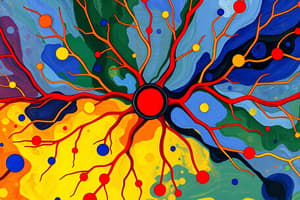Podcast
Questions and Answers
Which of the following best describes the role of neurophysiology?
Which of the following best describes the role of neurophysiology?
- Studying the interaction between neurons and behavior
- Investigating the electrical and chemical communication of neurons (correct)
- Examining the structure and function of the brain
- Analyzing the impact of neurotransmitters on neural receptors
What triggers the action potential in a neuron?
What triggers the action potential in a neuron?
- Electrochemical signals (correct)
- Resting membrane potential
- Synaptic potentials
- Neurotransmitter release
What is the function of receptors in neuronal communication?
What is the function of receptors in neuronal communication?
- To encode and affect signals (correct)
- To generate action potentials
- To release neurotransmitters
- To restore the resting membrane potential
What is the resting membrane potential of a neuron?
What is the resting membrane potential of a neuron?
What is the purpose of the myelin sheath in neuronal communication?
What is the purpose of the myelin sheath in neuronal communication?
What are the nodes of Ranvier?
What are the nodes of Ranvier?
What causes multiple sclerosis?
What causes multiple sclerosis?
Which type of cells support and maintain neural structure?
Which type of cells support and maintain neural structure?
What is the function of myelin in neurons?
What is the function of myelin in neurons?
What is the main way that neurons communicate with each other?
What is the main way that neurons communicate with each other?
What triggers the release of neurotransmitters into the synaptic cleft?
What triggers the release of neurotransmitters into the synaptic cleft?
What happens to unbound neurotransmitters in the synapse?
What happens to unbound neurotransmitters in the synapse?
What is the function of EPSP in neuronal communication?
What is the function of EPSP in neuronal communication?
What is the integration of multiple inputs that are coming from presynaptic neurons called?
What is the integration of multiple inputs that are coming from presynaptic neurons called?
What is the function of oligodendrocytes in the nervous system?
What is the function of oligodendrocytes in the nervous system?
Study Notes
Neurophysiology and Neuronal Communication
- Neurophysiology is the study of the functions and processes of neurons, including the generation and transmission of electrical signals.
Action Potential
- The action potential in a neuron is triggered by a rapid change in the electrical properties of the cell membrane, usually caused by an excitatory neurotransmitter.
Receptors and Neuronal Communication
- Receptors play a crucial role in neuronal communication by receiving and responding to neurotransmitters released by other neurons.
- They are specific proteins on the surface of neurons that bind to neurotransmitters, allowing the signal to be transmitted.
Resting Membrane Potential
- The resting membrane potential of a neuron is approximately -70 millivolts (mV), which is a stable, negatively charged state.
Myelin Sheath
- The myelin sheath is a fatty, insulating layer that surrounds the axon of a neuron, allowing electrical signals to propagate faster and more efficiently.
- It is composed of lipid-rich cells called oligodendrocytes in the central nervous system (CNS) and Schwann cells in the peripheral nervous system (PNS).
Nodes of Ranvier
- The nodes of Ranvier are small gaps in the myelin sheath, where the axon is exposed and allows the electrical signal to propagate.
Multiple Sclerosis
- Multiple sclerosis is a neurological disease caused by the deterioration of the myelin sheath, leading to disruptions in neuronal communication.
Supporting Cells
- Glial cells, including astrocytes, oligodendrocytes, and microglia, support and maintain neural structure and function.
Myelin Function
- Myelin serves to insulate and facilitate the transmission of electrical signals along the axon of a neuron.
Neuronal Communication
- The main way that neurons communicate with each other is through the release of neurotransmitters into the synapse, which then bind to receptors on adjacent neurons.
Neurotransmitter Release
- The release of neurotransmitters into the synaptic cleft is triggered by an action potential reaching the axon terminal.
Unbound Neurotransmitters
- Unbound neurotransmitters in the synapse are either broken down by enzymes or taken back up by the neuron through a process called reuptake.
EPSP
- The function of EPSP (excitatory postsynaptic potential) is to increase the likelihood of an action potential in the postsynaptic neuron.
Integration of Multiple Inputs
- The integration of multiple inputs from presynaptic neurons is called synaptic integration.
Oligodendrocytes
- Oligodendrocytes are a type of glial cell that produces and maintains the myelin sheath in the CNS, allowing for efficient transmission of electrical signals.
Studying That Suits You
Use AI to generate personalized quizzes and flashcards to suit your learning preferences.
Description
Test your knowledge of neurophysiology and neurochemistry with this quiz! Covering topics such as neuron basics, action potentials, electrochemical signals, and the communication between neurons, this quiz will help you understand the fundamentals of how the brain works.




